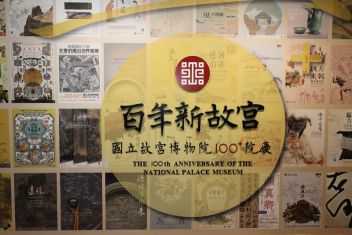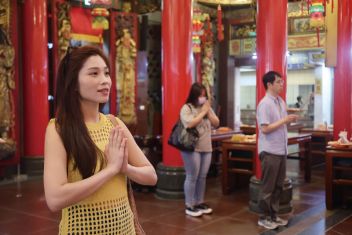
Malaysian-born Chang Kuei Hsing, who has won the United Daily News Grand Literary Award, the Golden Tripod Award, the Taiwan Literature Award, and the Taipei International Book Exhibition Book Prize, is one of Taiwan’s leading novelists.
Originally from Southeast Asia, these writers have put down roots in Taiwan, where their books are widely acclaimed. As Taiwanese writers, they even enjoy popularity overseas. We may refer to them as “Malaysian-born writers in Taiwan.”
“You may remember Woon Swee Oan, a Malaysian-born writer who came to study Chinese literature at National Taiwan University (NTU). His wuxia novels were immensely popular in the 1980s, rivaling the works of Jin Yong and Gu Long.
Both born in Sarawak on the island of Borneo, novelists Lee Yung Ping and Chang Kuei Hsing are the Chinese-language equivalents of Gabriel García Márquez.
We also have husband and wife Chan Tah Wei and Chong Yee Voon, who have bagged most of Taiwan’s literary prizes.
Malaysian-born ethnic Chinese writers specializing in different genres continue to spring to prominence as each generation succeeds the last. How do we account for the existence of this literary community—a group that demonstrates such unique, salient features?

Originally from Malaysia, Ko Chia Cian has spent more than 20 years in Taiwan.
Longing for Taiwan
The Japanese-born Nobel-laureate British writer Kazuo Ishiguro once said: “People are not two-thirds one thing and the remainder something else. Temperament, personality, or outlook don’t divide quite like that. The bits don’t separate clearly. You end up a funny homogeneous mixture. This is something that will become more common in the latter part of the century—people with mixed cultural backgrounds, and mixed racial backgrounds. That’s the way the world is going.”
Taiwan’s Malaysian-born writers bear witness to the truth of Ishiguro’s words. Back in the 1960s, many ethnic Chinese youths in Malaysia who had cultural aspirations were unwilling to subject themselves to the restrictions of their native country’s education system. Attracted by Taiwan’s policy of Overseas Chinese education, and yearning for the cultural vitality of the island, where they would be able to use their mother tongue, they came here for their university studies. Many began to publish their writings and organize literary groups here while they were still students.
What some critics regard as the peak of Taiwan literature occurred in the 1980s. It was an age of literary prizes, the most prestigious being those hosted by the China Times and the United Daily News, which conferred honor, offered generous financial rewards, and led to multiple offers of publishing contracts. For many aspiring young writers, these awards represented stepping stones to a literary career. Several Malaysian-born writers rose to fame by riding this literary wave, including Shang Wanyun, the first Malaysian-born writer to win the United Daily News Fiction Prize, Lee Yung Ping, who was then pursuing postgraduate studies in the United States, and Chang Kuei Hsing, who was studying in the Department of English at National Taiwan Normal University.
Malaysian-Chinese literature
However, Malaysian-Chinese literature as an established field relies not only on the indefatigable efforts of writers but also on academic research. Since the 1990s, scholar–writers such as Ng Kim Chew, Chong Yee Voon, and Chan Tah Wei have been playing an important role in increasing and sharpening our awareness of Malaysian-Chinese literature.
Specializing variously in fiction, nonfictional prose, or poetry, these people have much in common. They came to Taiwan for their undergraduate studies, and eventually received their doctoral degrees here. Some of them were already well known in their student days as winners of literary prizes. They all continued to work as academics upon graduation, preoccupying themselves with creative writing while also engaging in scholarly criticism. Having spent nearly 20 years plowing their field, they have edited several anthologies of Malaysian-Chinese writings.
“Literary texts are brought into academia to be researched, and they furnish teaching materials on campus. At the same time, critics publish selected works and anthologies. A literary work gains recognition when it is studied and incorporated into our literary canon,” says Ko Chia Cian, associate professor of Chinese literature at NTU.
Taiwan enjoys a wholesome literary environment, from creative writing and publishing to criticism and research. As a result, the country occupies a vital place in the world of Chinese-language literature. It’s little wonder that Chan Tah Wei sees Taiwan, alongside East and West Malaysia, as one of the three major seats of Malaysian-Chinese literature.

Lee Yu-cheng formerly directed the Institute of European and American Studies at the Academia Sinica. His own experience of diaspora has led him to pay special attention to minority ethnic groups, and he often writes about British writers of Asian heritage, as well as African-American writers.
Publishing in Taiwan
One reason why Taiwan is an important place for Chinese-language literature is the size of its reading public.
In comparison, Malaysia’s ethnic diversity, combined with the fact that its official language is Malay, means that there isn’t a large enough readership for works in Chinese to form an independent market there, even though many Malaysians are educated at Chinese-medium private secondary schools run by ethnic Chinese, and can read Chinese or even write creatively in Chinese.
“Even though there are Chinese-language publishers in Malaysia now, such as Got One and Mentor, they follow self-publishing or independent publishing models; big Chinese-language publishing corporations seldom take on literary works,” says Tee Kim Tong, an associate professor in the Department of Foreign Languages and Literature at National Sun Yat-sen University who has worked on Malaysian-Chinese literature.
As for Hong Kong, although Chinese is the main language there, its population is only big enough to sustain commercially successful writers. Many writers of literary works in Hong Kong turn to Taiwan for their publishing projects, with the result that some of their books are published in Taiwan but not in Hong Kong. “Simply put, they regard Taiwan as an operations center for Hong Kong literature,” Ko Chia Cian observes.
In addition, the leading literary prizes in Taiwan are remarkably diverse, embracing different genres such as modern poetry, nonfictional prose, fiction, and reportage. In this they contrast with major literary awards overseas—such as the Booker Prize, the Prix Goncourt, and the Akutagawa Prize—which focus on single genres, the vast majority of them being devoted to fiction. Taiwan’s literary marketplace is prosperous: with nearly 40,000 new books published each year, the number of publications per capita here is second only to that in the United Kingdom. Moreover, Taiwan’s regulatory framework for publishing is underpinned by an open-minded attitude: all sorts of subjects and types of books are being published. Books exploring gender issues and social movements, for example, are seldom seen elsewhere in the Chinese-speaking world. All of these constitute the strengths of Taiwan’s creative environment. “Writing is a private undertaking. You can write wherever you are. But if you hope that your writing will go down in history, Taiwan is a good place to work,” says Lee Yu-cheng, a Malaysian-born scholar who has written on Malaysian-Chinese literature, and who formerly served as director of the Institute of European and American Studies at Academia Sinica.
Universality
Writing is indeed a private undertaking, but it’s also embedded in the external world. In other words, one wonders whether those writers “whose work revolves around the Malaysian ethnic Chinese experience, but who write within the linguistic context peculiar to Taiwan,” would be able to produce work of the same quality if they were based in their native country.
Chang Kuei Hsing, who has lived in Taiwan for more than 40 years, gives a negative answer. He thinks that maintaining a certain distance from one’s native place is key. Writing in Malaysia, he says, is different from writing about it in another country: “There are things that you see more clearly when you observe them from a distance.”
The “sense of distance” sometimes triggers this response from Taiwanese readers: “Why are you always writing about your native Sarawak, rather than about Taiwan?” Lee Yu-cheng analyzes the psychology of Malaysian-born writers this way: “The memories of childhood and youth embedded deep in their minds have accrued a sense of distance through physical separation and the passage of time. The writers gain creative impetus by ruminating on their memories and past experiences.”
In fact many famous writers elsewhere in the world show the same tendency in their writings. “If you took away writers like Kazuo Ishiguro and Salman Rushdie, modern English literature would lose much of its charm. If we look at Taiwan, without immigrant writers like Lee Yung Ping, Chang Kuei Hsing, and Ng Kim Chew, or writers with parents from Southeast Asia, like Fang Hui-chen and Chen Yu-chin, Taiwanese literature would still exist, but it would certainly lose a lot of its luster,” Lee Yu-cheng says.

Taiwan’s publishing industry enjoys great freedom and welcomes a diversity of voices. Malaysian-born writers have substantially enriched Taiwanese literature. (photo by Kent Chuang)
Rediscovering meanings
Accordingly, when reading Malaysian-Chinese literature—or any other kind of immigrant literature—we shouldn’t judge a work by its subject, but by its content and the quality of the writing. After all, only when a society gives free rein to creative content, and takes under its wing people of different ethnic backgrounds, can it win everyone’s heart.
Chang Kuei Hsing tells us he is embarking on a writing project about Lin Wang, an elephant that lived in Taipei Zoo for many years. Prior to coming to Taiwan, this much-loved animal was used for military purposes in Burma (now Myanmar) during World War II. Like Chang’s other novels, the new project will involve marshaling complex historical facts and ethnic issues, but Chang is confident: “I’ve been turning the idea over in my mind for a long time, so it won’t take long to write.”
Recently retired from the Academia Sinica, Lee Yu-cheng has started to write poems again, just as he did in his youth. One of them—“Returning to the Fishing Village at Night”—has these lines: “Family love is like a familiar old book / Whenever I leaf through it, expecting nothing in particular / New meanings come to light / Or like tea leaves picked from old branches / To be baked into that sweet fragrance long missed.”
Perhaps for these Malaysian-born writers who share a dual sense of home, Taiwan is also like a “familiar old book.” Chang Kuei Hsing’s new novel sends Lin Wang back from the zoo to the warfront in Southeast Asia, unearthing a fragment of history that was consigned to oblivion. “Leafing through” Taiwan’s history from a Chinese-Malaysian perspective, writers like Chang rediscover, enrich—and even create—meanings for their adoptive island. Though “picked from old branches,” these meanings exude a sweetness that can stand the test of time.
For more pictures, please click 《A Dual Sense of Home: Malaysian-Born Writers in Taiwan》











